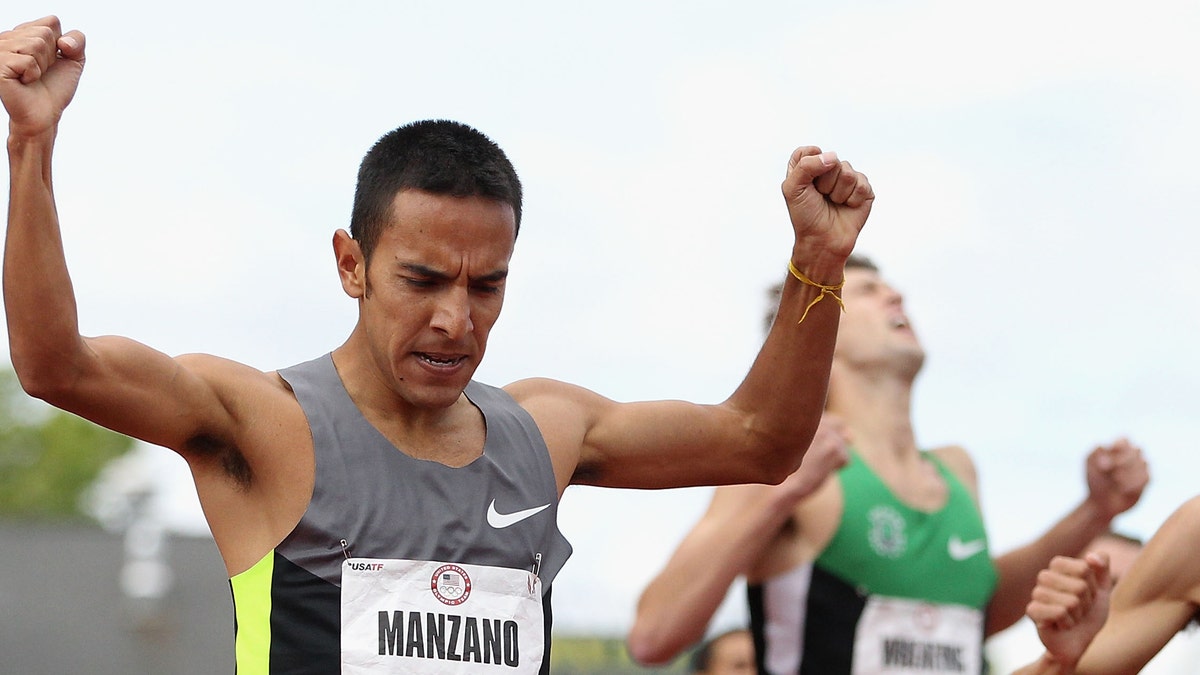
EUGENE, OR - JULY 01: Leonel Manzano celebrates as he crosses the finish line to win the Men's 1500 Meter Run Final on day ten of the U.S. Olympic Track & Field Team Trials at the Hayward Field on July 1, 2012 in Eugene, Oregon. (Photo by Christian Petersen/Getty Images) (2012 Getty Images)
Leo Manzano’s rise to two-time Olympian was as unlikely as it is inspiring. The 27-year-old runner will compete as part of Team USA in the 1500 meters in London.
Born in Mexico, Manzano moved to the United States with his family when he was 4. He was raised in Texas, where he became a nine-time state track champion.
“Growing up in the Hispanic community, you don’t really expect to go to the Olympics,” Manzano said. “A lot of my friends were kind of expected to go to college. With [my parents], it was, ‘As long as you graduate high school, we’re fine.’”
In fact, early in Manzano’s racing career, one of the biggest challenges he faced came not from the track, but from his parents.
“My family is from Central Mexico,” Manzano explained. “It’s an agriculturally-based area and sports is seen as something that you do as like a pastime or on the weekends when you have nothing to do. I started running and they were like, ‘What are you doing? Get a job. Do something productive.’”
Over time, as their son continued to excel and improve as a runner, Manzano’s parents also began to see the possibilities a successful track career would provide him. College had never really been something Manzano viewed as an opportunity available to him. Track made that not only a possibility, but a reality. He attended the University of Texas on a track scholarship, where he became a four-time national champion and nine-time All-American.
He also had another hurdle to overcome.
“By the time I was a senior in high school, I knew if I ever wanted to compete for the U.S., I was going to have to be an American citizen,” Manzano said. “I live in the U.S. I’m still very much connected to my Mexican heritage, but my home is the U.S. I wouldn’t change it for the world.”
At that point, he had resident status for four or five years. Manzano became a U.S. citizen in late 2004. Less than four years later, he made his Olympic debut in Beijing. Manzano was one of just a handful of Latino athletes on the team. (An Associated Press review of the 2008 U.S. Olympic team found Hispanics made up only about 4 percent of athletes.)
“I do represent the U.S., but I also feel like I represent the Hispanic community,” he said.
Manzano finished 12th in his semifinal heat in Beijing. After a long wait and a lot of work, Manzano said he’s matured as a competitor since Beijing. He’s also made changes when it comes to everything from nutrition to strength training to physical therapy. Those small tweaks have helped lead to big improvements.
After six years of (literally) chasing a national title in the 1500 – and finishing as runner-up four times – Manzano crossed the finish line in first at the 2012 Olympic trials. The win gave Manzano his much-sought national championship and also secured his second straight trip to the Olympics.
Now, he’s enthusiastic about his second chance and peaking at the right time.
“I feel great in terms of my training,” Manzano said days before the Games began. “It's the best that it’s ever been. Even in terms of my mental focus, it’s the best that it's ever been. It’s been a long time from 2008 to 2012.”
Manzano plans to show how far he’s come in those four years when he crosses the finish line at London Olympic Stadium.








































